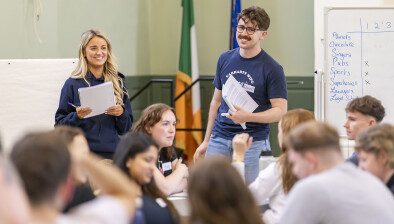Registered intermediaries to be trained at University of Limerick

Helen McEntee
A new qualification programme to train intermediaries who will help vulnerable people, including sexual abuse victims and children, when giving evidence in the justice system has been launched at the University of Limerick in collaboration with the Department of Justice.
The part-time professional diploma in intermediary studies has been welcomed as a milestone in the implementation of the O’Malley review, which recommended making available a panel of registered, qualified intermediaries to work with vulnerable victims in sexual assault cases.
The role of a registered intermediary will be to assist in the communication process, whether between lawyers and witnesses during trial or, earlier, during Garda interviews.
Justice minister Helen McEntee said: “The introduction of a new programme for intermediaries is a key action in Supporting a Victim’s Journey, my plan to create a more victim focussed criminal justice system.
“It outlines reforms to protect victims of sexual violence during the investigation and prosecution of sexual offences, and committed that appropriately qualified intermediaries should be recruited and registered.
“I’m delighted that my Department has been able to collaborate with the University of Limerick to provide a suitable course to train intermediaries to the required standard.
“Once qualified, they will have an essential role in assessing the communication needs of vulnerable witnesses and to advise An Garda Síochána, advocates and the court on the steps needed to assist such witnesses to give their best evidence.”
Dr Aoife Gallagher, who led the project team designing the programme, said: “We are delighted to have been successful in applying to work with the Department of Justice on designing and delivering this interfaculty programme.
“The values of the programme are aligned closely with the core values of all we do at UL in producing ethical graduates who are social reformers, motivated to contribute to a fairer society.
“We believe that the collaboration places UL at the forefront of national efforts to secure effective and meaningful participation for vulnerable individuals when engaging with the Irish justice system.”







